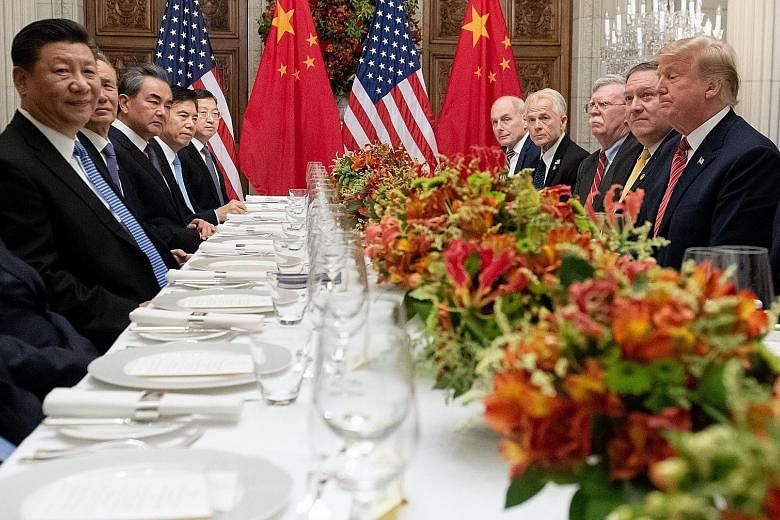United States President Donald Trump's strategy of confronting China over its economic practices appears to be working - at least for now, judging by the steps Beijing has taken after the recent meeting between the US leader and his Chinese counterpart Xi Jinping, where they agreed to a 90-day truce on their trade dispute.
But foreign policy watchers and pundits in Washington remain wary, pointing to previous occasions when China made public promises only to renege on them.
So far, though, the Chinese appear to be holding up their end of the bargain reached over dinner after the Group of 20 summit in Buenos Aires, Argentina, two weeks ago.
The White House declared immediately after the dinner that Beijing had agreed to start purchasing agricultural products from US farmers immediately, and Reuters on Wednesday reported that China had bought 1.5 million tonnes of soya bean. On Tuesday, Bloomberg reported that China had proposed cutting tariffs on US-made cars from 40 per cent to 15 per cent.
The biggest sign of change came on Wednesday too, with The Wall Street Journal reporting that China had decided to scrap its Made in China 2025 plan and open up its market to more foreign firms.
China watcher Bill Bishop said on the Axios news website: "This is a huge deal - if China is really serious about making substantive changes to this plan, rather than just repackaging it. Only time will tell, but given the history of failed promises of reform and better access for foreigners, people should be wary until Beijing actually delivers."
Added Mr Bishop, who runs the Sinocism China newsletter: "If real changes are made, however, then it is definitely a win for President Trump, foreign firms and, frankly, the Chinese economy."
But caution was the buzzword among US foreign policy watchers.
Dr Patrick Cronin, senior direc-tor of the Asia-Pacific Security Programme at the Centre for a New American Security, said on Twitter: "The Trump administration should be wary of settling for a virtual makeover."
Former US ambassador and Milken Institute Asia fellow Curtis Chin said on a Fox Business interview: "My hope is that there will be progress, but history has shown, sometimes, it is more rhetoric than reality in terms of what China promises to move things down the road."
He and others pointed to, among other things, Mr Xi's agreement with President Barack Obama in 2015 to stop cyber espionage between their two countries. But just last month, the US Trade Representative Office concluded that Chinese state-sponsored entities were attacking firms at an even higher rate.
Washington was reminded on Wednesday that the issue of Chinese cyber espionage remained a major unresolved issue between the two countries.
Mr Bill Priestap, assistant director of the Federal Bureau of Investigation's counterintelligence division, told the Senate Judiciary Committee that Chinese cyber espionage was "the most severe counterintelligence threat facing our country today".
Separately, in a Fox and Friends interview, US Secretary of State Michael Pompeo pinpointed China as the source of a cyber attack on the Marriott hotel chain's guest reservation system, which exposed the data of up to 500 million guests.
Responding to a journalist's comment that the latest Chinese espionage and influence operation in the US was the Marriott hack, Mr Pompeo said: "That is right."
Perhaps the clearest indication both sides still had quite a distance to go to bridge their trade differences came from Commerce Secretary Wilbur Ross. In a CNBC interview on Wednesday, he said "enforcement mechanisms" would be needed in any trade agreement in case China did not play by the rules.
"What you will see if we did get to a trade agreement with China is there will be verification procedures, there will be enforcement mechanisms because the paper itself is one thing, but you really need detailed implementation and a means to correct," he said.
But such changes in China's behaviour would require legislative change in some instances, and changes in practices and in the court system in other cases, he said.
"So, we are talking about some fairly fundamental structural changes that, over time, will be needed to accomplish at least our end purposes," said Mr Ross.
Most experts believe that this would be a long-term process.
Mr Chin said: "The reality is that the troubles between the two great nations will not be solved in 90 days. But my hope is that there will be incremental progress."

